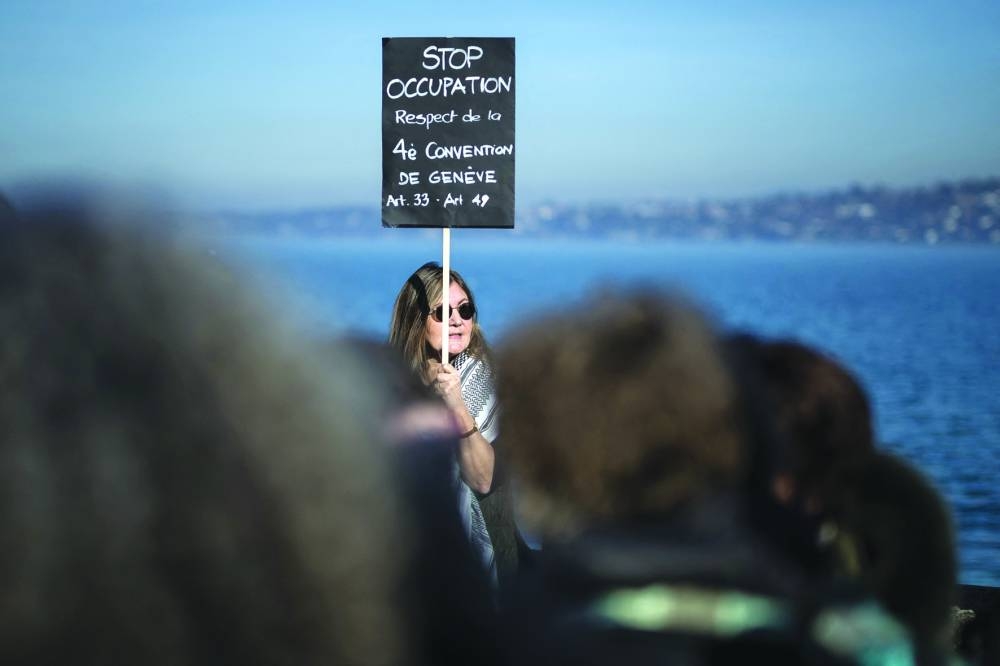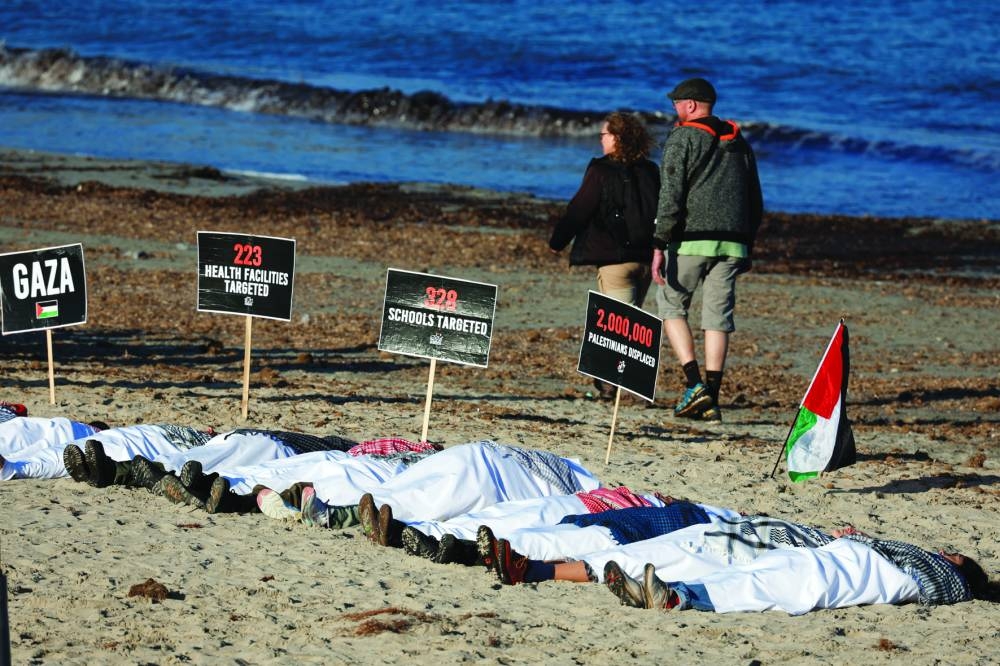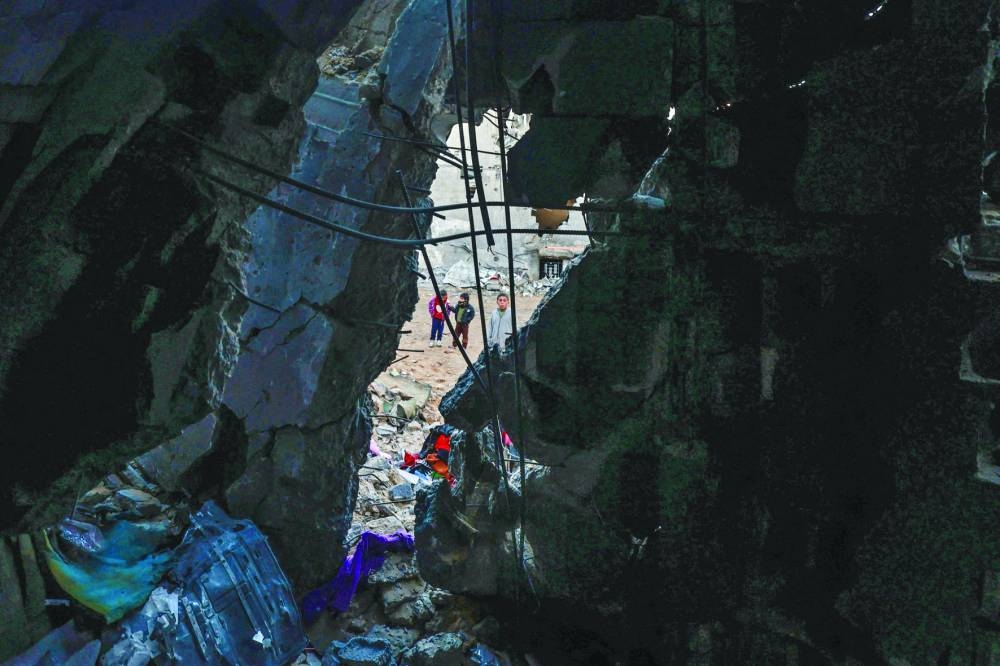Israel pressed its blistering assault in the Gaza Strip yesterday as fears grew over a push into Rafah, the southern city teeming with civilians uprooted by the nearly four-month war.
A barrage of air strikes and tank fire rocked Khan Younis overnight and through the day, an AFP journalist said of the main city in southern Gaza that has been the focus of Israel’s offensive.
The health ministry in Hamas-run Gaza said more than 100 people were killed across the Palestinian territory overnight, mostly women and children.
The Israeli army said its forces killed “dozens of terrorists” in northern and central Gaza over the past 24 hours.
Hundreds of thousands of Gaza’s 2.4mn people displaced by the fierce fighting have fled south to Rafah since the outbreak of the war, with their tents crammed along streets and in parks.
The city that had been home to 200,000 people now hosts more than half of Gaza’s population, the United Nations said.
Civilians who fled to Rafah have been pushed up against the border with Egypt, trying to avoid parts of the city exposed to the fighting in nearby Khan Yunis.
AFPTV images showed Palestinians gathered around a row of body bags at the Najjar hospital in Rafah after Israeli strikes.
“The children were just sleeping and suddenly the bombardment happened. God took one of my children and three escaped death,” said Ahmad Bassam al-Jamal, who also lost his father.
“The place turned black, I couldn’t see what’s in front of me. It was all dust and dirt. I was touching my surroundings, I was looking for my mobile to use the flashlight to look for my children, where are they? I found them under the rubble,” said al-Jamal.
“I cried for help and people came. I got out Yamen, the first one, he was the only one I can see, the rest were still under the rubble. They pulled out Yamen, Eileen and Sila and they pulled out their mother (all alive),” he said. “We could not find Bassam, we were looking for him, but he was buried, we could not save them, I swear we couldn’t.”
Hamas remained defiant, with an official from the Palestinian Islamist group that has ruled Gaza since 2007 saying that it is “holding its ground” in Khan Younis.
“The resistance is still steadfast in Khan Younis ... it is inflicting losses on the occupation,” said Mahmud Mardawi. “The enemy will not achieve anything by targeting Khan Younis.”
The United Nations humanitarian agency OCHA said it is deeply concerned about the escalation of hostilities in Khan Younis, which has pushed more and more people south.
“Rafah is a pressure cooker of despair, and we fear for what comes next,” said OCHA spokesman Jens Laerke.
Israeli Defence Minister Yoav Gallant had warned on Thursday that the military is set to train its sights on Rafah.
“We are achieving our missions in Khan Younis, and we will also reach Rafah and eliminate terror elements that threaten us,” he said in a video message the defence ministry sent to journalists.
The war in Gaza was sparked by the events of October 7, which resulted in the deaths of about 1,160 people, mostly civilians, according to an AFP tally based on official figures.
Militants also seized around 250 hostages, and Israel says 132 remain in Gaza, including at least 27 believed to have been killed.
Vowing to eliminate Hamas, Israel launched a massive military offensive that has killed at least 27,238 people in Gaza, mostly women and children, according to the health ministry.
Israel has lost 224 soldiers since starting its Gaza ground operations in late October, according to the army.
The fighting has devastated the narrow coastal strip, while an Israeli siege has resulted in dire shortages of food, water, fuel and medicines.
Image analysis released on Friday by the UN satellite centre UNITAR based on footage collected on January 6-7 showed “approximately 30%” of Gaza’s structures had been affected by the war.
The soaring civilian death toll in Gaza, as well as concerns among Israelis over the fate of the hostages, have fuelled calls for a ceasefire.
US Secretary of State Antony Blinken will travel to the Middle East yet again in the coming days to press a new proposal involving the release of Israeli hostages in return for a pause in the fighting, the State Department said.
Blinken will visit Qatar and Egypt – the mediators of the proposal – as well as Israel, the occupied West Bank and Saudi Arabia starting today, it added.
The trip would be his fifth since the war broke out.
A Hamas source said it had been presented with a plan involving an initial six-week pause in fighting that would see more aid delivered into Gaza and exchanges of certain Israeli hostages for Palestinian prisoners held in Israel.
The leaders of Hamas and its Gaza ally Islamic Jihad, Ismail Haniyeh and Ziyad al-Nakhalah, respectively, discussed the latest development and said any future ceasefire must lead to “a full withdrawal” of Israeli troops from Gaza, Haniyeh’s office said.
A brief November truce lasted just one week, when militants freed 110 women, children and foreign hostages in exchange for Palestinians held in Israeli jails.
The war has sparked a surge in attacks by Iran-backed groups in the region in support of the Palestinians.
The US military launched a wave of air strikes against Iranian forces and Tehran-backed fighters in Iraq and Syria overnight in retaliation for a drone attack in Jordan that killed three US soldiers on Sunday.
US forces in the Middle East and their allies have faced stepped-up attacks since the war in Gaza began, coming under fire more than 165 times since mid-October.
Hamas denounced the strikes, saying the United States would bear “responsibility for the consequences of this brutal aggression ... which pours oil on the fire”.
In Lebanon, meanwhile, the Israeli army said its warplanes struck targets of the Iran-backed Hezbollah group.

A woman holds a placard on the Geneva Convention during a demonstration in Geneva for a ceasefire in Gaza and in solidarity with the Palestinian people.

Activists wrapped in white sheets lie in the sand, while placards and a Palestinian flag are displayed during a symbolic protest action at Ghadira Bay in Mellieha, Malta.

Children check the damage following Israeli bombardment in Rafah in the southern Gaza Strip.
